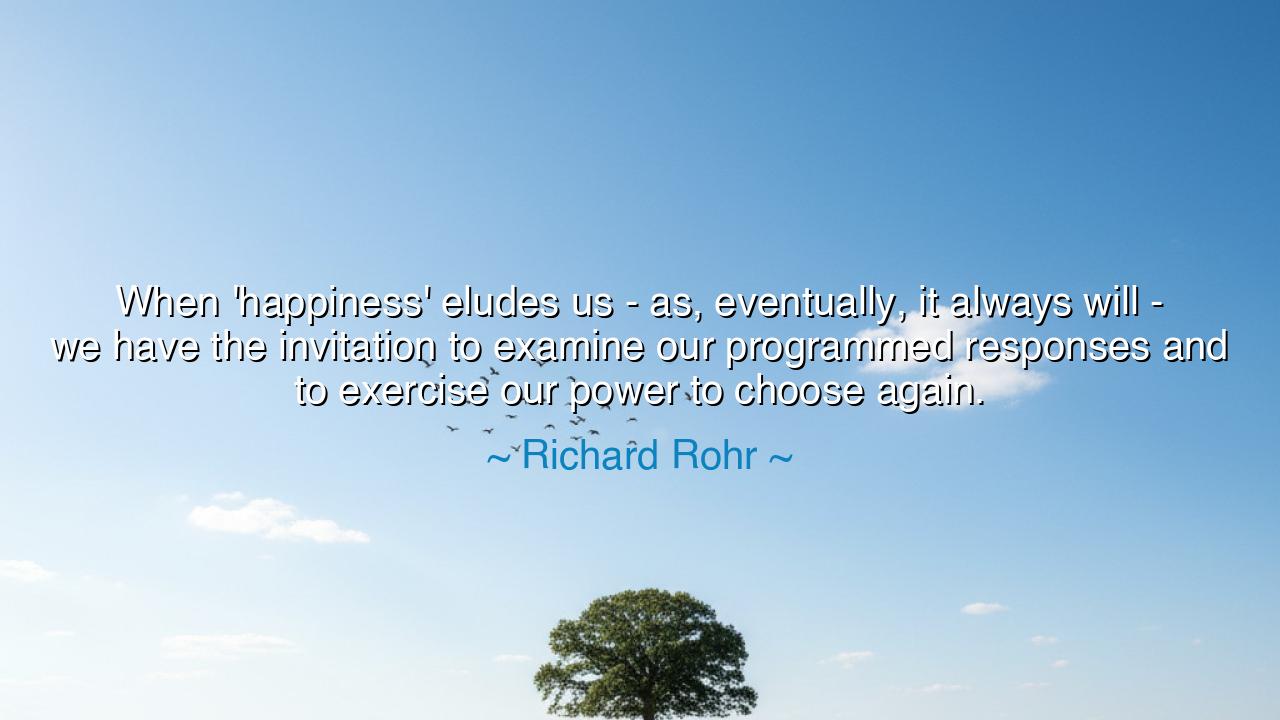
When 'happiness' eludes us - as, eventually, it always will - we
When 'happiness' eludes us - as, eventually, it always will - we have the invitation to examine our programmed responses and to exercise our power to choose again.






“When ‘happiness’ eludes us — as, eventually, it always will — we have the invitation to examine our programmed responses and to exercise our power to choose again.” — Thus spoke Richard Rohr, the Franciscan mystic and teacher of the inner life, whose wisdom draws from both ancient faith and timeless psychology. In these words, he unveils one of the deepest truths of the human spirit: that happiness, fleeting and fragile as a shadow in the afternoon sun, is not our true end. When it fades — and it always does — we are not abandoned; rather, we are invited to awaken, to look inward, and to reclaim the divine freedom that lives within us. Rohr reminds us that disappointment is not the failure of life, but its calling card, summoning us to a deeper way of being.
The origin of this wisdom lies in the long spiritual tradition of awakening through suffering — a theme known to the mystics of every age. From the Psalms of David to the meditations of the Buddha, the same truth is echoed: the pursuit of worldly happiness cannot satisfy the infinite hunger of the soul. It is the nature of all fleeting joys to dissolve, and when they do, the soul feels its restlessness, its ache for permanence. Rohr, following the ancient path of contemplation, teaches that this moment — the loss of happiness — is not to be feared, but embraced. It is the moment when illusion dies and the opportunity for transformation is born.
To “examine our programmed responses” is to confront the habits of the mind that keep us bound to illusion. From birth, we are trained to chase pleasure, success, comfort, and approval, believing that these will bring us peace. But when they fail, we respond with anger, fear, or despair — like slaves rebelling against the collapse of their chains. Rohr urges us to see that these reactions are not who we truly are; they are the programming of a fearful ego. When happiness eludes us, we must pause and look at these patterns with the eye of awareness, asking: Why do I suffer? What am I clinging to? What false god have I worshiped? In that questioning, the chains begin to loosen, and a deeper freedom dawns.
The ancients knew this path well. Consider the story of Job, the righteous man of the Old Testament, who lost his family, his wealth, and his health. In his anguish, he cried out to God, demanding answers, but none came — only silence and the whirlwind. Yet from that silence, Job emerged transformed. He had lost the happiness of possessions and security, but in losing them, he found wisdom — the understanding that faith and peace do not depend on circumstance. He had “chosen again,” not the shallow comfort of old certainties, but the living trust that endures beyond them. Rohr’s teaching is of the same lineage: when life takes from us the things we love, it is not cruelty, but invitation — an opening into the eternal.
To exercise our power to choose again is the essence of spiritual maturity. It is the realization that while we cannot control what happens to us, we can always choose how to respond. The ego seeks control; the spirit seeks freedom. When happiness deserts us, the ego says, “All is lost.” But the awakened heart says, “Now I am being taught.” Each sorrow, each disappointment, becomes a threshold. We may step backward into resentment or forward into surrender and growth. Thus, happiness is not the measure of a good life — conscious choice is. And this power to choose anew, again and again, is what makes the soul unbreakable.
Look also to the life of Viktor Frankl, the psychiatrist and survivor of the Nazi concentration camps, who discovered this truth amid unimaginable horror. Stripped of everything — his freedom, his family, his dignity — he realized that one freedom remained: the freedom to choose his attitude. “Everything can be taken from a man but one thing,” he wrote, “the last of the human freedoms — to choose one’s attitude in any given set of circumstances.” In that moment of loss, he found meaning, the one treasure that no suffering could destroy. Frankl’s discovery is the very heart of Rohr’s insight — that even when happiness perishes, the soul’s freedom endures.
The lesson, then, is this: do not cling to happiness as your salvation. It is a fair-weather friend, beautiful but transient. When it departs, do not despair; see in its absence the call to grow in wisdom and freedom. When you feel lost or broken, pause. Look inward. Ask what part of you is reacting — the fearful child, the proud self, the one that demands comfort? Then breathe, and choose again — choose patience, gratitude, forgiveness, love. For these are not feelings that depend on the world; they are powers of the soul, unshaken by circumstance.
So remember, my child: happiness will come and go like the tides, but freedom is the still ocean beneath them. When life disappoints you — when joy slips through your fingers — do not chase after it like a mirage. Instead, let the moment refine you. Let it show you who you are beneath the surface of pleasure and pain. And when you have seen yourself clearly, stand tall, and choose again — not for comfort, but for truth. In that choice lies the eternal peace that even sorrow cannot take away.






AAdministratorAdministrator
Welcome, honored guests. Please leave a comment, we will respond soon